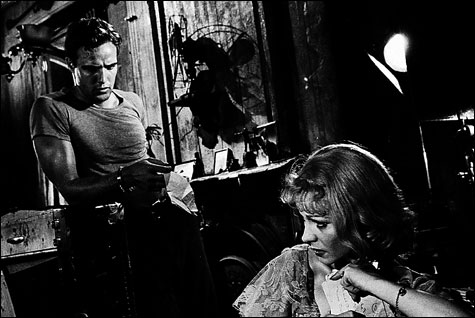
A STREETCAR NAMED DESIRE: Kazan directed Marlon Brando’s two most influential performances — in Streetcar with the equally brilliant Vivien Leigh. |
| “The Complete Elia Kazan” | Harvard Film Archive: July 31–August 24 |
The arc of Elia Kazan's professional life has its origins in the Group Theatre, where he was trained as an actor and performed in the original 1930s productions of Clifford Odets's
Waiting for Lefty and
Golden Boy. By the mid '40s, he'd given up acting to become the first American director to maintain successful simultaneous careers in the theater and in film. In 1947, he staged the Broadway production of
A Streetcar Named Desire, bringing Marlon Brando to the attention of the American theatergoing audience, and he taught the first cohort at the Actors Studio. He also won the 1947 Best Director Oscar for
Gentleman's Agreement.
The complete retrospective of Kazan's movies at the Harvard Film Archive allows us to see, as a kind of triptych, the three distinct stages of his movie career: the pictures he made in Hollywood between 1945 and 1950; his iconic movies, beginning with the film of A STREETCAR NAMED DESIRE (August 22 at 9:15 pm) in 1951 and ending with Splendor in the Grass a decade later; and his disparate final quartet of releases, spread from 1963 to 1976. The series even includes a documentary short, "People of the Cumberland" (screens with Wild River August 7) that he co-directed in 1937 and a couple of glimpses of him as a wiry, intense character actor, in the satirical short "Pie in the Sky" (1934; screens with Pinky), and playing a jazz musician in the 1941 musical BLUES IN THE NIGHT (August 14 at 7 pm). This last was the second and final Hollywood picture he appeared in, and despite the disparaging remarks he later made about himself as an actor, he's quite effective in it.
Given his background in the Group Theatre, which was dedicated to mounting plays built around social and political issues, it's not surprising that half of the first half-dozen movies he directed were social-problem pictures. GENTLEMAN'S AGREEMENT (August 24 at 7 pm) dramatizes Laura Z. Hobson's bestseller about a journalist (Gregory Peck) who pretends to be a Jew in order to expose anti-Semitism as a fact of daily American life. BOOMERANG! (August 21 at 9:15 pm) is the true story of a Connecticut DA (Dana Andrews) who prosecutes the alleged murderer of a beloved local minister, realizes he's got the wrong man, and, bucking vested political interests, proves the man's innocence. PINKY (August 1 at 9:15 pm) is about a light-skinned black woman (Jeanne Crain) who returns to her small Southern town after three years of passing for white in a Northern nursing school.
Gentleman's Agreement is the famous one of this trio, but it's the only one that — except for a vibrant supporting performance by Kazan's old Group colleague John Garfield — isn't much good. It's genteel and Hollywoodized, and the stakes don't seem very high. Pinky is also conventional in many ways (that includes the casting of Crain, a white movie star), but it has surprising elements: in the performances (Crain's among them), in the way Pinky's treatment at the hands of her neighbors often illuminates the worst side of both whites and blacks, and in the moody visual portrait of the shantytown where Pinky moves in with the grandmother who raised her (the great Ethel Waters).